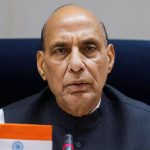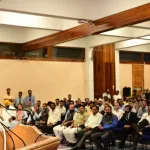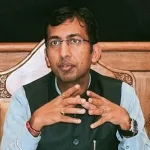Ramadan is a month of spiritual reflection for Muslims worldwide. During Ramadan, Muslims refrain from eating and drinking during daylight hours.
Although some people including patients are exempted from fasting but generally as doctors say people need to take precautions to stay healthy and hydrated.
While explaining the benefits of fasting, Dr Sheikh Mohd Saleem, a public health expert said it is important to drink lots of water because the body is more prone to dehydration and increased thirst.
“Excessive usage of spices and salt should be avoided. It is best to avoid spicy dishes at Iftar since they enhance the body’s desire for water. Furthermore, the use of salt in salads and during cooking is reduced,” he said.
Saleem, a health consultant of UNICEF J&K, said people who consume sweets contain a lot of sugar have been found in studies to enhance thirst. But instead, they should eat fruits to replenish body fluids.
“The optimal time to exercise during the fasting period is immediately after Iftar because your body has been supplied with food and drink to generate energy and will have ample time to recover lost fluids during exercise,” he said.
He said people should consult a doctor to examine their health, establish whether they are permitted to fast, change medication dosages as needed, and determine the ideal time to take them between Iftar and Suhour.
The doctor said fasting provides an opportunity to relax the digestive system from its year-round labour and offers significant advantages in the treatment of various chronic conditions like obesity, psychological stress, high blood sugar, high cholesterol and triglyceride levels, blood pressure, renal difficulties and heart disease can all be reduced.
Saleem said during fast, insulin levels in the body decrease, which allows the body to burn fat for energy instead of glucose. Additionally, fasting can help to increase metabolism, reduce appetite, and promote fat burning.
However, it is important to note that fasting alone is not a magic solution for weight loss. It is crucial to combine fasting with a healthy and balanced diet and regular physical activity to achieve sustainable weight loss.
Furthermore, fasting may not be suitable for everyone, especially individuals with certain medical conditions. It is advisable to consult a healthcare professional before starting or planning for fasting.
The health expert said patients with ascites, hepatic coma, blood vomiting, late-stage fibrosis, and those at high risk of low blood sugar are recommended not to go for fasting.
How can people avoid the risk of dehydration during Ramadan?
During Ramadan, when Muslims fast from dawn to dusk, it is important to take precautions to avoid dehydration, especially in hot and dry climates. It is important to drink at least 8-10 glasses of water or other fluids, such as fruit juice, milk or soup, to keep the body hydrated. Seek medical attention if you experience symptoms of dehydration, such as dizziness, headache, dry mouth, and decreased urine output.
Dental tips during Ramadan:
· Brush your teeth shortly after Suhoor and Iftar meals
· Remember to floss after Suhoor
· Increase water consumption during non-fasting hours
· Reduce your consumption of sugary drinks, coffee, tea, and other beverages that promote dehydration
· Increase your diet of fruits and vegetables
· Avoid sticky meals
· Using Miswak during fasting hours helps to clean teeth and increases saliva, preventing mouth dryness and foul breath. If you use dentures, make sure you clean them properly before use
Tips for avoiding illness during Ramadan:
· Don’t skip Suhoor (pre-dawn meal) since this may lengthen your fast, which is not recommended in this hot season and may result in dehydration and fatigue.
· Drink as much water as you can between Iftar and bedtime.
· Salty foods should be avoided during Iftar and Suhoor meals.
· Avoid caffeine-containing beverages such as coke, coffee, and tea.
· Avoid consuming high-fat meals, which frequently induce stomach problems (when using oil in food preparation, use only a small amount of olive oil or other polyunsaturated fats).
· Avoid processed carbs and sugar, which can trigger blood sugar spikes and weight gain (e.g. white bread, white rice, sweets, and pastries).
· Suhoor meals should include proteins, oils, complex carbs such as beans, and half a cup of fresh juice or half a piece of fruit.
· Break your fast with an Iftar meal that is simple and easy to digest, such as three dates, half a cup of orange juice, or one cup of vegetable soup. These aid in restoration of your glucose levels to normal and the regulation of your appetite during the main meal.








